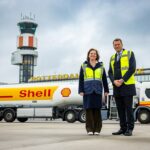The UK aviation sector is at risk of “competitive disadvantage” if it does not receive adequate support for the transition to cleaner, greener fuels, David Morgan, easyJet’s chief operating officer, said.
Speaking at Airlines 2023, Morgan said a combination of investment, policy and regulation were needed to support the aviation industry in transitioning to lower carbon technologies.
“It’s imperative that we capitalise on our nation’s strengths,” Morgan said.
“The UK has a track record in research and development and a leading position in the aerospace industry, as well as groundbreaking work we’re doing in hydrogen is really world class.
“If this is complemented with appropriate investment policy and regulation we will not only keep pace with other markets, but lead by example.”
‘Competitive disadvantage’
He added: “Without this, we face a real risk that the UK aviation industry is put at a competitive disadvantage compared to those in the EU and the US.
“We need to ensure that there are equivalent levels of government support for the transition we need to make.”
The UK government has brought forward a number of measures to support greener aviation.
In September, the Department for Transport (DfT) committed to introducing a revenue certainty mechanism to support sustainable aviation fuel (SAF) production in the UK and boost its uptake, giving producers greater assurance about earnings from the SAF they produce.
Separately, nine projects have been awarded a share of £53 million in the latest round of the DfT’s Advanced Fuels Fund (AFF).
The full £135 million AFF pot is designed to help companies convert waste materials and by-products – such as household waste like cooking oil and industrial gases – into fuels.
The latest round’s winning projects include a demo plant converting sawmill and forestry waste and a commercial plant using power-to-liquid technology to convert CO2 and green hydrogen into plane fuel.
Together, both projects could create over 70,000 tonnes of SAF a year.
EasyJet sustainability
EasyJet has itself put sustainability at the heart of its operation with new fuel-efficient aircraft and a focus on schemes that collectively will deliver a significant reduction in carbon emissions.
In 2021, the company demonstrated its first ever SAF flight with 30% blend out of London Gatwick, and it has carried out ultra low emissions turnaround trials at Bristol Airport, which resulted in a 97% reduction in CO2.
The low-cost carrier has also taken part in ground-breaking partnerships with Airbus and Rolls-Royce, and in November 2021 it signed up to the UN-backed Race to Zero.
EasyJet is targeting a 35% reduction in emissions intensity by 2035, and by 2050 net zero carbon emissions with a 78% reduction in intensity.
There are also fuel savings to be made through initiatives including single engine taxi and engine washing, a 10% reduction by 2035 through the Single European Sky and modernisation of UK airspace, and residual emissions will be removed to reach Net Zero by 2050.
Subscribe to the FINN weekly newsletter
You may also be interested in:
Aviation can reach net zero without capping flights, says Mark Harper

